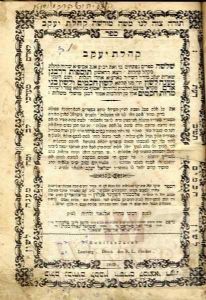A Short Tribute
Hacham Israel Yaakov Elghazi, son of Hacham Yom Tov Elghazi, was born in 1680 in Izmir, Turkey. He studied with Hacham Haim Aboulafia and Hacham Yitzhak Hacohen Rappaport in the Izmir yeshiva as a young man. While in Izmir, he had the kabbalist book Hemdat Yamim published. Though its authorship is uncertain, some attributed it to Hacham Israel Yaakov Elghazi himself.
In 1735 he immigrated to the Land of Israel, where he studied at the Beth El kabbalist yeshiva. He officiated as halakhic adjudicator at Rishon LeZion Hacham Elazar Nachum's rabbinic court, as did Rishon LeZion Hacham Haim Moshe Nissim Mizrachi and Rishon LeZion Hacham Yitzchak Hacohen Rappaport, who had been his teacher in Izmir.
In 1755 Hacham Israel Yaakov Elghazi was appointed Rishon LeZion, and would serve in this position for his entire life. He also presided over the Neve Shalom – Brit Abraham yeshiva where the great sages of Jerusalem studied. He issued many responsa that guided his community and was among those to make the sweeping public amendments necessary to meet the Jerusalem community's needs of the period, including Al Inyan HaRavakim (On the Matter of Bachelors], and Tsimtsum Hahotsa'ot leTsarkei Motarot [Limiting Superfluous Expenses].
Hacham Israel Yaakov Elghazi passed away on 10 Tammuz, 5516 (1757) and was buried in the Kehal Hassidim section of the Mount of Olives, next to the tomb of Hacham Shalom Mizrachi Shar'abi, known as the RaSHa"SH.
Hacham Israel Yaakov Elghazi authored many books: Shalmei Tsibbur – Laws and customs, Naveh Yaakov – responsa and sermons, Ma'aneh Lashon – on the rules of the Talmud, Emet L'Yaakov – Laws governing Torah scrolls and customs pertaining to public needs, Ar'ah D'Rabbanan – Torah laws and rabbinic laws, Kehilot Yaakov – responsa on the Talmud, Magid Devarav L'Yaakov – a commentary on the Passover Haggadah, and others.
